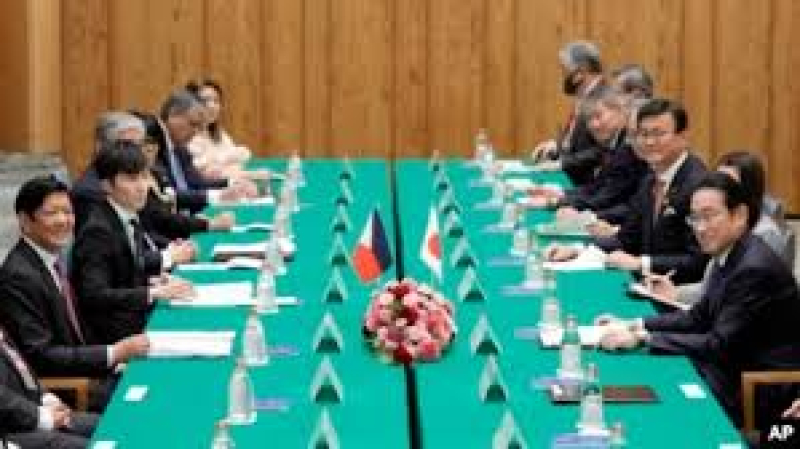- Sri Lanka urges Pakistan to reconsider India match |
- Centre of World Cup storm Mustafizur lands PSL deal with Lahore |
- BNP and Jamaat election camps vandalized in Gazipur |
- Dhaka requests UN rights office investigation into Hadi murder |
- Bangladesh establishes formal diplomatic ties with Grenada |
Japan seeks to defend national interests in South China Sea

Japan is set to improve its strategic partnership with the Philippines at an upcoming trilateral meeting with the United States amid rising tensions between Beijing and Manila.
Leaders of the three countries, who will meet April 11 in Washington, are expected to discuss maritime security issues that are drawing Japan into a more robust military role in the Asia-Pacific region.
China used water cannons last month to disrupt a Philippine mission to resupply its garrison in a disputed portion of the South China Sea, an attack that President Ferdinand Marcos Jr. called “illegal, coercive” and warranting countermeasures, reports VOA.
Despite its geographical distance from the South China Sea, Japan’s national interests lie in defending peace across the region, according to Alexander Vuving, professor at the Asia-Pacific Center for Security Studies.
“From the Philippines' perspective, Japan is Manila's second most important partner in the South China Sea, second only to the United States, given Japan's high commitment to keeping the sea free of Chinese dominance; Japan's robust economic and military capabilities; and Japan's proximity to the sea,” he told VOA.
Protecting regional dominance
Freedom of navigation in the maritime region is vital to Japan, which sees 90% of its energy and trade flow through the South China Sea. Japan relies heavily on importing crude oil from Saudi Arabia and the United Arab Emirates, while one-fourth of the nation’s total trade in 2019 was from the European Union and members of ASEAN that also rely on the sea route.
Vuving added that Japan has changed its strategy from depending only on the U.S.-Japan military alliance to taking a more proactive role in defending its own national interests.
“The protection of the sea lines of communication that connect Japan with the rest of Afro-Eurasia is prominent in this vision because these maritime routes are some of the main arteries of Japan's supply chains,” he said.
Ken Jimbo, a Keio University professor specializing in Japanese defense and security policy, said Japan is aiming to keep China’s maritime presence in check.
“Diplomatically, [keeping China in check] allows Japan to strengthen its position in the Indo-Pacific region, fostering closer security and defense cooperation with like-minded countries to counterbalance China's assertiveness,” he told VOA.
Japan announced late last year that it was in talks with the Philippines for a defense pact known as a Reciprocal Access Agreement (RAA) that would provide for enhanced security assistance.
“The negotiation of a Japan-Philippines RAA signifies a deepening military cooperation, aiming to elevate their defense relations,” Jimbo said. “Japan is considered a powerful ally for the Philippines, not just in terms of military equipment but also in enhancing interoperability and strategic alignment against common security challenges in the region.”
Early last year, the two countries signed terms of reference that simplified the process for Japanese forces to enter the Philippines for humanitarian assistance.
Further friction with China?
Japan’s siding with the Philippines and the U.S. has created friction in sometimes bumpy Sino-Japanese relations. China’s foreign minister, Wang Yi, urged Japan to “take actions that are beneficial to regional peace and stability,” state media CGTN reported in late March.
The sources of friction between the two countries range from anger over Japan’s use of sexual slavery during World War II to the release of wastewater from the disabled Fukushima nuclear power plant. There is also a long-standing dispute over islands in the East China Sea known as Diaoyu to China and Senkaku to Japan.
Jimbo said the trilateral summit in Washington could strain Sino-Japanese relations, but that the benefits outweigh the costs.
“It is a calculated move within Japan’s broader regional strategy,” he said. “The dynamics of Japan-China relations are complex, with economic interdependence coexisting with strategic rivalry, suggesting that both nations are accustomed to managing fluctuations in their relationship.”
Vuving said China is unlikely to react by raising tensions over the Diaoyu/Senkaku islands.
“Such tensions would only strengthen Japan’s belief in seeking regional cooperation to deny Chinese regional dominance,” he said. “China may seek ways to hurt Japan economically, but for Japan, the trilateral cooperation … helps to redress the balance of power in the South China Sea in the long term … and would be immensely important if a conflict occurred over Taiwan.”
China is currently Japan’s largest trading partner, and one of the largest investment destinations for Japanese companies. Japan exports semiconductors and electronic parts to China and imports telecommunications and computer equipment from it, according to government data.
Experts say that after the trilateral meeting, Japan is expected to send its naval vessels to patrol with the U.S and the Philippines and will likely join military drills in the South China Sea.

